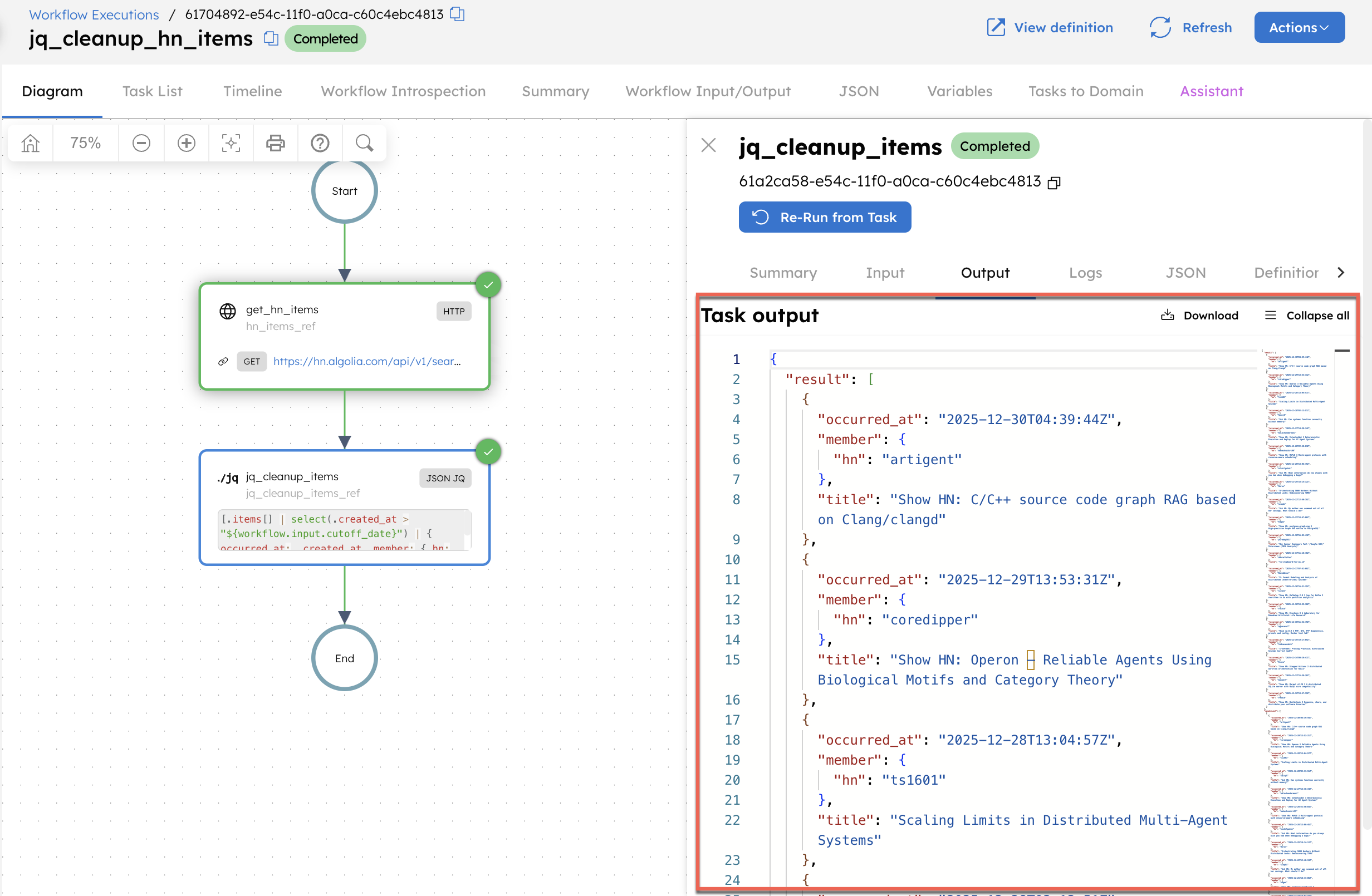JSON JQ Transform
The JSON JQ Transform task allows the processing of JSON data using jq.
A JSON JQ Transform task evaluates a queryExpression using jq syntax to transform JSON data provided as input parameters. The task processes the data based on the specified query, and the output is a transformed JSON object or array.
Task parameters
Configure these parameters for the JSON JQ Transform task.
| Parameter | Description | Required/ Optional |
|---|---|---|
| inputParameters | JSON object containing the configuration data for task execution. Supports string, number, boolean, null, and object/array. | Required. |
| inputParameters.queryExpression | A string representing a JQ (JSON Query) expression. This expression is used to transform the JSON data. | Required. |
If your JSON JQ Transform expression references a workflow secret (such as ${workflow.secrets.<secret-name>}), the resolved value is automatically masked in the task output. For details on masking behavior, see Masking Parameters.
The following are generic configuration parameters that can be applied to the task and are not specific to the JSON JQ Transform task.
Other generic parameters
Here are other parameters for configuring the task behavior.
| Parameter | Description | Required/ Optional |
|---|---|---|
| optional | Whether the task is optional. If set to true, any task failure is ignored, and the workflow continues with the task status updated to COMPLETED_WITH_ERRORS. However, the task must reach a terminal state. If the task remains incomplete, the workflow waits until it reaches a terminal state before proceeding. | Optional. |
Task configuration
This is the task configuration for a JSON JQ Transform task.
{
"name": "json_transform",
"taskReferenceName": "json_transform_ref",
"type": "JSON_JQ_TRANSFORM",
"inputParameters": {
"persons": [
{
"name": "some",
"last": "name",
"email": "mail@mail.com",
"id": 1
},
{
"name": "some2",
"last": "name2",
"email": "mail2@mail.com",
"id": 2
}
],
"queryExpression": ".persons | map({user:{email,id}})"
}
}
Task output
The JSON JQ Transform task will return the following parameters.
| Parameter | Description |
|---|---|
| resultList | List of results returned by the JQ expression. |
| result | The first element of the resultList. |
| error | Optional error message if the JQ query fails. |
Adding a JSON JQ Transform task in UI
To add a JSON JQ Transform task:
- In your workflow, select the (+) icon and add a JSON JQ Transform task.
- In Script Parameters, add the parameter that the JQ expression will evaluate.
- In JQ expression, enter the expression to be evaluated.
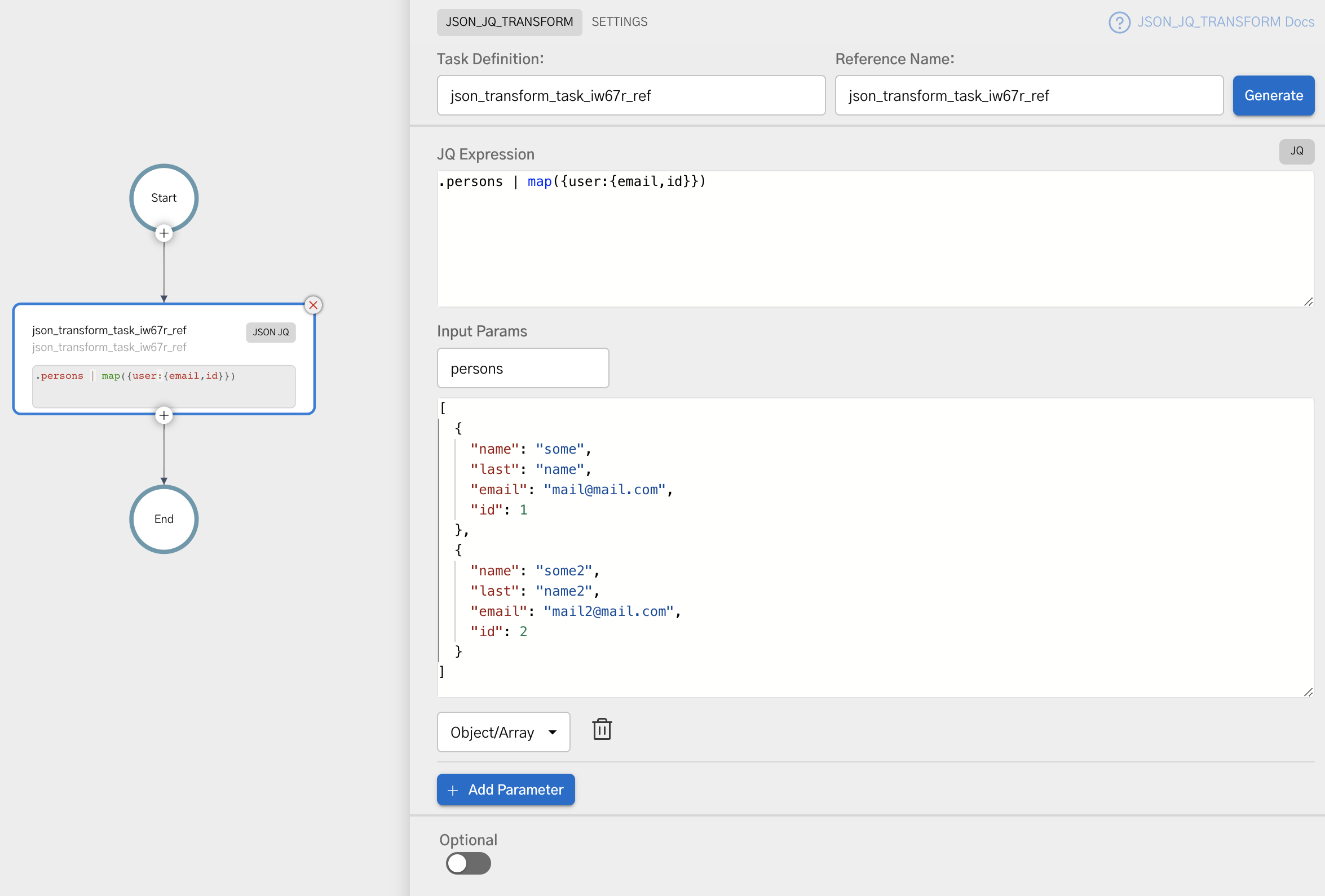
Examples
Here are some examples for using the JSON JQ Transform task.
Using JSON JQ Transform task in a workflow
This example builds a workflow that uses a JSON JQ Transform task to concatenate two arrays by using a JQ expression.
To create a workflow:
- Go to Definitions > Workflow, from the left navigation menu on your Conductor cluster.
- Select + Define workflow.
- In the Code tab, paste the following workflow definition:
{
"name": "jq_transform_concat_arrays",
"description": "Concatenates two arrays using a JSON JQ Transform task.",
"version": 1,
"tasks": [
{
"name": "jq_example_task",
"taskReferenceName": "jq_example_ref",
"inputParameters": {
"key1": {
"value1": "${workflow.input.value1}"
},
"key2": {
"value2": "${workflow.input.value2}"
},
"queryExpression": "{ key3: (.key1.value1 + .key2.value2) }"
},
"type": "JSON_JQ_TRANSFORM"
}
],
"inputParameters": [
"value1",
"value2"
],
"outputParameters": {
"key3": "${jq_example_ref.output.result.key3}"
},
"schemaVersion": 2
}
- Select Save > Confirm.
To run the workflow:
- Go to the Run tab, and enter the Input params. For example:
{
"value1": ["a", "b"],
"value2": ["c", "d"]
}
- Select Execute.
This takes you to the workflow execution page. Once completed, it returns the workflow output as follows:
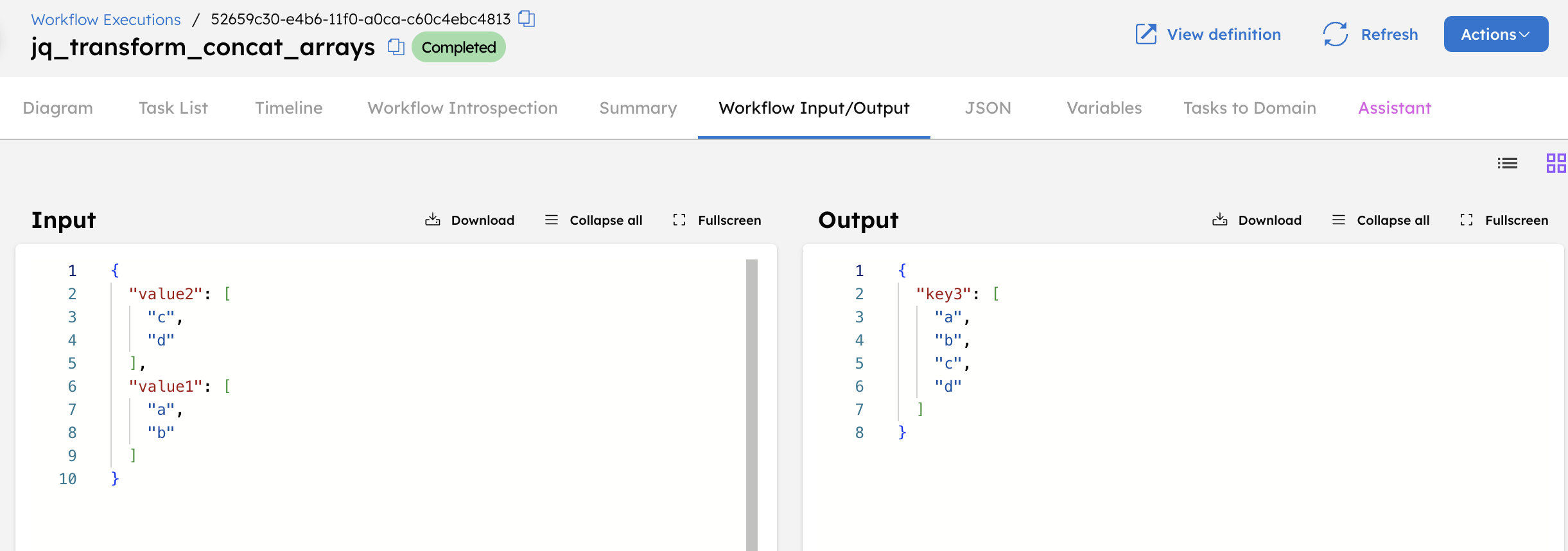
How the JSON JQ Transform task works in this workflow
The input parameters for the JSON JQ Transform task are defined as follows:
"inputParameters": {
"key1": {
"value1": "${workflow.input.value1}"
},
"key2": {
"value2": "${workflow.input.value2}"
}
}
The task uses these inputs:
- key1.value1: First array (["a", "b"])
- key2.value2: Second array (["c", "d"])
The queryExpression parameter contains the following JQ expression:
{ key3: (.key1.value1 + .key2.value2) }
This expression concatenates the arrays value1 and value2 into a single array under key3.
In the workflow execution, select the task jq_example_task to view the task output. The task returns:
result—The first result produced by the JQ expression.resultList—All results produced by the expression. In this example, the expression returns a single result.
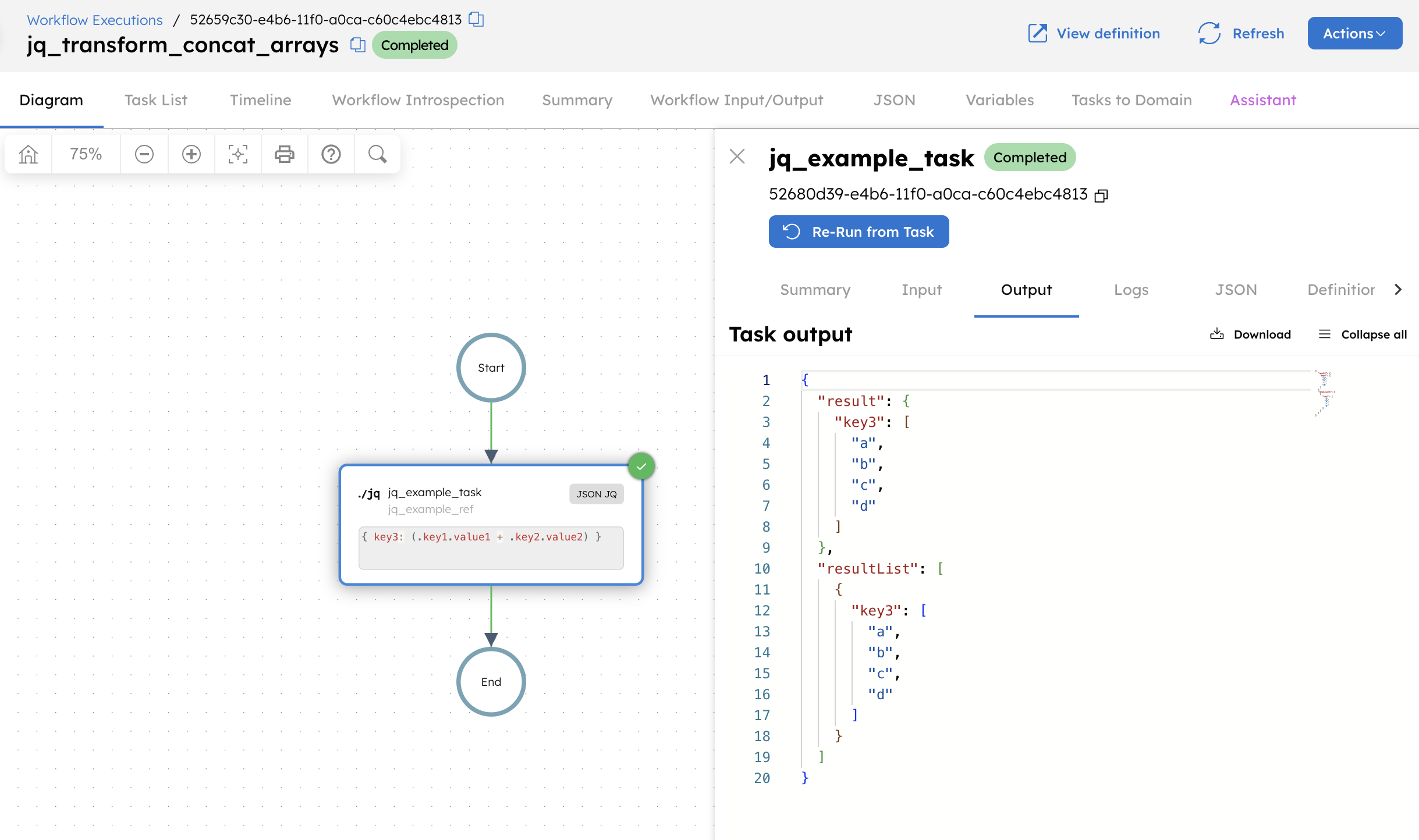
Clean up an API response using JSON JQ Transform
This example builds a workflow that retrieves recent stories from the Hacker News Algolia API and uses a JSON JQ Transform task to filter and reshape the API response.
To create a workflow:
- Go to Definitions > Workflow, from the left navigation menu on your Conductor cluster.
- Select + Define workflow.
- In the Code tab, paste the following workflow definition:
{
"name": "jq_cleanup_hn_items",
"description": "Retrieves recent Hacker News items and filters/reshapes the response using JSON JQ Transform.",
"version": 1,
"tasks": [
{
"name": "get_hn_items",
"taskReferenceName": "hn_items_ref",
"inputParameters": {
"uri": "https://hn.algolia.com/api/v1/search_by_date?tags=story&query=${workflow.input.query}",
"method": "GET",
"accept": "application/json",
"contentType": "application/json"
},
"type": "HTTP"
},
{
"name": "jq_cleanup_items",
"taskReferenceName": "jq_cleanup_items_ref",
"inputParameters": {
"items": "${hn_items_ref.output.response.body.hits}",
"queryExpression": "[.items[] | select(.created_at > \"${workflow.input.cutoff_date}\") | { occurred_at: .created_at, member: { hn: .author }, title: .title }]"
},
"type": "JSON_JQ_TRANSFORM"
}
],
"inputParameters": [
"query",
"cutoff_date"
],
"outputParameters": {
"cleaned_items": "${jq_cleanup_items_ref.output.result}"
},
"schemaVersion": 2
}
- Select Save > Confirm.
To run the workflow:
- Go to the Run tab, and enter the Input params. For example:
{
"query": "distributed systems",
"cutoff_date": "2025-09-30T00:00:00Z"
}
- Select Execute.
This takes you to the workflow execution page. Once completed, it returns the following output:
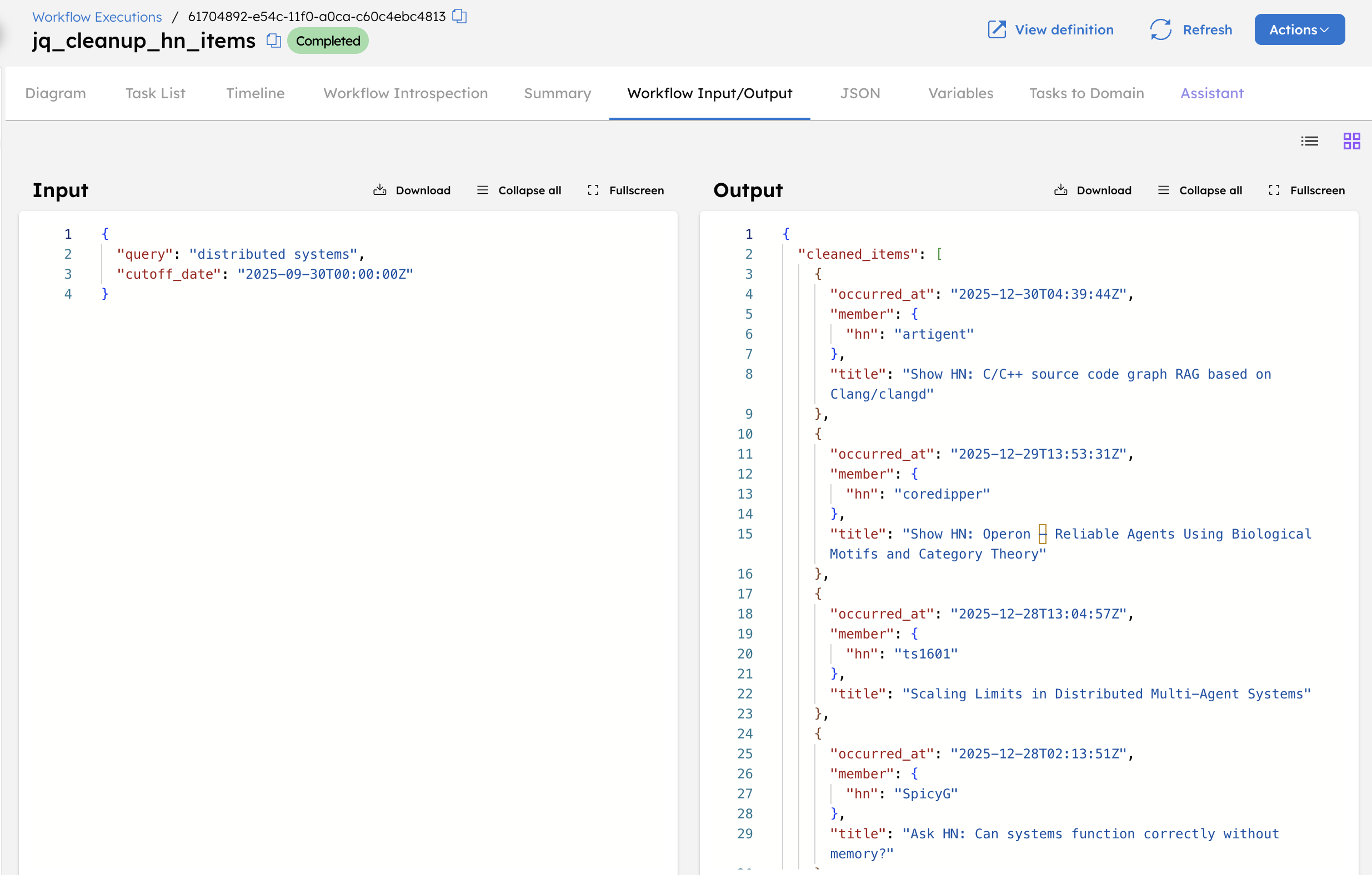
How the JSON JQ Transform task works in this workflow
The HTTP task via the Hacker News API returns a verbose JSON response that includes an array. Each entry contains many fields, such as timestamps, author details, URLs, and metadata.
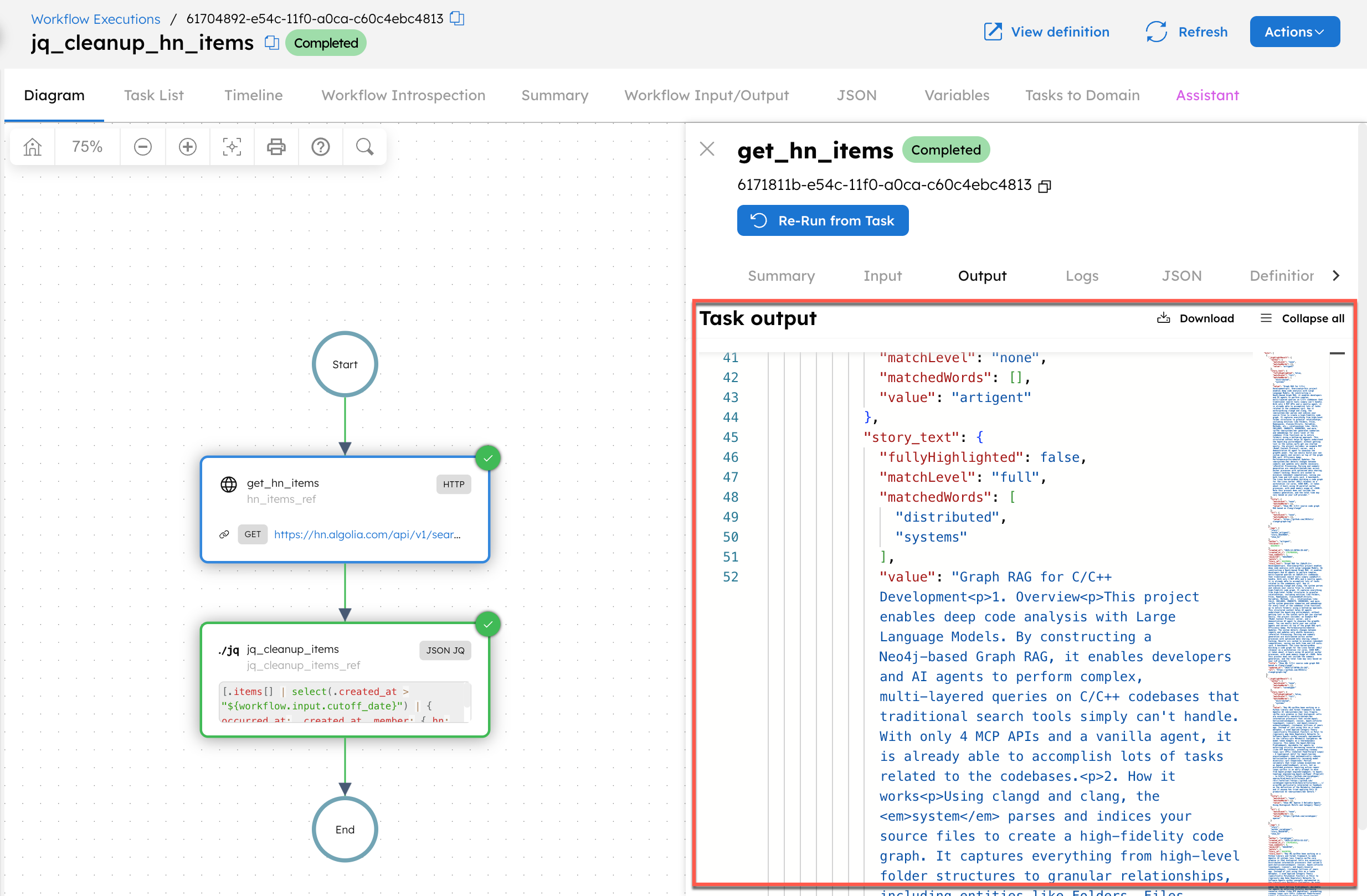
In this workflow, the JSON JQ Transform task reduces that response to a simplified structure that includes only:
- When the story was created (
occurred_at) - Who created it (
member.hn) - The story title (
title)
The JSON JQ Transform task applies this JQ expression:
[.items[] | select(.created_at > "${workflow.input.cutoff_date}") | { occurred_at: .created_at, member: { hn: .author }, title: .title }]
This expression:
- Iterates over each entry in the
.itemsarray. - Filters entries where
created_atis later than the specified cutoff date. - Constructs a simplified object that includes only the required fields.
- Returns the results as an array.
The JSON JQ Transform task returns:
result: The transformed array returned by the JQ expression.resultList: All results produced by the expression. In this example, the expression returns a single array.
